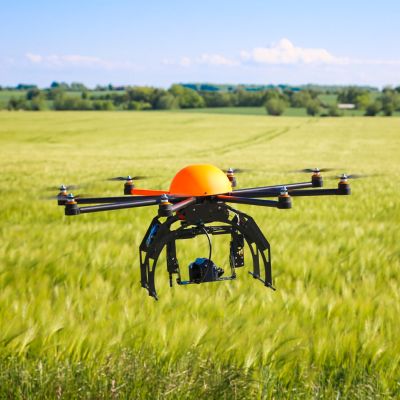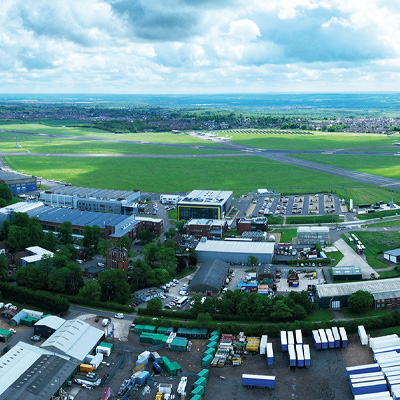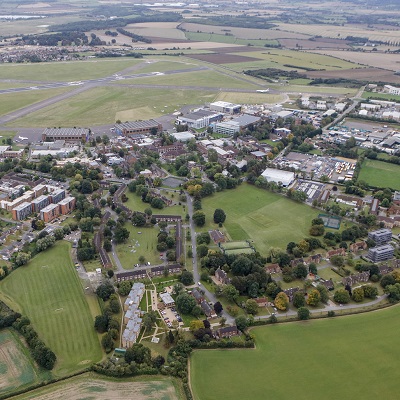We regularly review and update our portfolio of courses to ensure that they meet the needs of industry now and in the future. As part of this review the decision has been made to withdraw the Global Environmental Change and Planetary Health MSc.
Overview
- Start dateFull-time: October, part-time: October
- DurationOne year full-time, two-three years part-time
- DeliveryTaught modules 80 credits/800 hours, Group projects 40 credits/400 hours, Individual project 60 credits/600 hours
- QualificationMSc, PgDip, PgCert
- Study typeFull-time / Part-time
- CampusCranfield campus
Who is it for?
We welcome students from a variety of academic backgrounds, ranging from economic and social sciences to natural sciences and engineering who have a passion for solving real-world problems and making a positive impact. The course has been specifically designed to support students with a desire to take a more multidisciplinary approach to their learning.
In this respect, you will have the opportunity to select from available module options from across the environment, water, and energy programmes, tailoring these with the help of a tutor, to suit your personal learning ambitions. You will develop a range of personal and leadership skills as you progress through the course, to set you on the path to a rewarding career in becoming part of the solution to the environmental challenges that we face today.
Your career
With the current global focus on finding ways to tackle global environmental and planetary health challenges, you can expect to be highly sought after by employers. Successful Cranfield students will develop diverse and rewarding careers in consultancies, research and teaching organisations, non-government organisations, along with national and local government departments involved in finding solutions to national and global environmental challenges. The international nature of this course means that career opportunities are not restricted to the UK. Cranfield graduates develop careers around the world and are internationally recognised by employers across the scientific, industrial and educational communities.
Cranfield Careers and Employability Service
Cranfield’s Career Service is dedicated to helping you meet your career aspirations. You will have access to career coaching and advice, CV development, interview practice, access to hundreds of available jobs via our Symplicity platform and opportunities to meet recruiting employers at our careers fairs. Our strong reputation and links with potential employers provide you with outstanding opportunities to secure interesting jobs and develop successful careers. Support continues after graduation and as a Cranfield alumnus, you have free life-long access to a range of career resources to help you continue your education and enhance your career.
Cranfield supports international students to work in the UK after graduation
Why this course?
The MSc in Global Environmental Change and Planetary Health will allow you to become part of the solution to address the environmental crises that we face today by providing you with the skills and knowledge required by both national and international organisations working in the environmental sector.
Informed by industry
The Global Environmental Change and Planetary Health MSc is designed to meet the current needs of employers and benefits from a strong input from industry experts. This gives our students the confidence to know that what they are learning is both relevant and beneficial to building a rewarding career.
Course details
MSc course structure:
Course delivery
Taught modules 80 credits/800 hours, Group projects 40 credits/400 hours, Individual project 60 credits/600 hours
Group project
The group project experience is highly valued by both students and prospective employers. It provides students with the opportunity to take responsibility for a consultancy-type project, working within agreed objectives, deadlines and budgets. For part-time students a dissertation or projects portfolio can replace the group project.
Individual project
The individual project is the chance for you to focus on an area of particular interest to you and your future career. These projects provide you with the opportunity to demonstrate your ability to carry out independent research, think and work in an original way, contribute to knowledge, and overcome genuine problems in the energy industry.
Modules
Keeping our courses up-to-date and current requires constant innovation and change. The modules we offer reflect the needs of business and industry and the research interests of our staff and, as a result, may change or be withdrawn due to research developments, legislation changes or for a variety of other reasons. Changes may also be designed to improve the student learning experience or to respond to feedback from students, external examiners, accreditation bodies and industrial advisory panels.
To give you a taster, we have listed the compulsory and elective (where applicable) modules which are currently affiliated with this course. All modules are indicative only, and may be subject to change for your year of entry.
Course modules
Compulsory modules
All the modules in the following list need to be taken as part of this course.
Fundamentals of Global Environmental Change
| Module Leader |
|
|---|---|
| Aim |
Human activity is accelerating consumption of natural resources and emissions of pollutants into the environment, destabilising planetary life support systems. This module will introduce you to these processes, identifying the drivers, pressures, changes in state, and impacts on the environment, as well as examining potential responses and solutions. It will cover the physical science-based understanding of our planetary systems, how humankind is modifying these systems, and examine current and future efforts to address these key challenges through science, technology, and policy. |
| Syllabus |
|
| Intended learning outcomes |
On successful completion of this module you should be able to:
|
Decision Science
| Module Leader |
|
|---|---|
| Aim |
The module introduces the context of environmental decision making, providing both a conceptual overview and practical tools for addressing environmental management problems. It aims to promote an understanding of weight-of-evidence approaches used to inform real-world problems by research, industry, and government. Central to this is an understanding of the strengths and limitations of different approaches and aspects of decision science, the social, economic, and environmental trade-offs made during decision-making, and how real-world complexity and future uncertainty is accounted for. Students will learn how to apply systems thinking to evaluate different courses of action in response to environmental challenges related to land, water, and/or energy. |
| Syllabus |
|
| Intended learning outcomes |
On successful completion of this module you should be able to:
|
Environmental Policy and Risk Governance
| Module Leader |
|
|---|---|
| Aim |
A critical application of environmental risk management is in the development and appraisal of policy in central government and business. Policies are developed to manage environmental risks and selection of policy options must be informed by risk based tools and techniques. Doing so demands a comprehension of the technical, organisational and human elements of governing environmental risks and developing environmental policy. This module draws these themes together by introducing core concepts and then illustrating these concepts with case studies spanning business and government, and finally application via a group exercise. Core lectures are supported by multiple case studies, a workshop and module assignment.
|
| Syllabus |
|
| Intended learning outcomes |
On successful completion of this module you should be able to:
|
Planetary Health
| Module Leader |
|
|---|---|
| Aim |
Applied scientific and green engineering principles are required to address the global and national environmental crises driven by climate change, land use change, pollution emissions, and population growth. This diverse module aims to develop an understanding of the interconnected environmental, social and health crises from a local to global scale, and the management, mitigation and adaptation strategies to address them from a planetary health perspective. As the module progresses, learners will be required to develop an advanced interdisciplinary understanding of exposure pathways and the interconnections between the natural environment, ecosystems, human health and wellbeing. Learners will be provided with the necessary systems thinking skills to assess the complexity and impact connecting environmental issues and human health in the Anthropocene and provide solutions; and to also appraise the reliance of human populations on healthy ecosystems, including the highly complex socio-ecological feedback mechanisms involved in interactions between humans and nature. |
| Syllabus |
• Interdisciplinary understanding of water, land and air interconnections of human health and wellbeing.
• Environment, health, and equity.
• Pathways to exposure.
• Systems thinking and holistic understanding of complexities.
• Enablers and inhibitors.
• Upstream causes and downstream effects.
• Fundamental concepts of structural, attitudinal and transactional (SAT) analysis.
• Case studies.
• Management solutions.
• Application of Vensim software for causal loop diagrams.
|
| Intended learning outcomes |
On successful completion of this module you should be able to: Interpret interactions and interconnections between natural environment, human health and wellbeing. Critically evaluate complex systems and the social and ecological approach to health promotion and disease prevention and control, ranging from individual to population level determinants of human and ecosystem health. Critically appraise the rights of humans and the rights of nature, giving all human populations and ecosystems, present and future, the opportunity to attain their full vitality. Characterise the linkages between environmental changes and human health at different geospatial and temporal scales. Synthesise diverse information to provide diverse solutions for planetary health challenges. |
Sustainable Environmental Solutions
| Module Leader |
|
|---|---|
| Aim |
This module aims to introduce you to the real-world environmental solutions that are being developed and/or already in use, to enable them to enter a number of sectors with up-to-date knowledge of current approaches. |
| Syllabus |
|
| Intended learning outcomes |
On successful completion of this module you should be able to:
|
Elective modules
From the following list, select three modules which total 30 credits.
Sustainability and Environmental Assessment
| Module Leader |
|
|---|---|
| Aim |
Environmental impact assessment and life cycle analysis are important tools for evaluating the sustainability of complex renewable energy technologies and industrial processes or products. The tools and concepts taught in this module will enable you to assess the sustainability of a case study from an environmental standpoint. Analysis of relevant case studies to demonstrate the assessment process, including how to account for uncertainty and sensitivity analysis. This module is 10 credits. |
| Syllabus |
|
| Intended learning outcomes |
On successful completion of this module you should be able to:
|
Air Quality Measurements and Management
| Module Leader |
|
|---|---|
| Aim |
This module aims to provide you with a specialist understanding of major air pollutants, their regulation, monitoring and management approaches both outdoors and indoors. The module will cover principal air pollution issues including an introduction to understanding the sources, sinks and distribution of major air pollutants, indoor–outdoor air quality issues (UK and global), Air quality and climate change, monitoring techniques, analytical methods, data analysis, health contexts and current policy and regulatory systems for statutory air pollutants. |
| Syllabus |
Series of lectures and interactive learning sessions covering: |
| Intended learning outcomes |
|
Catchments and Climate Change
| Module Leader |
|
|---|---|
| Aim |
|
| Syllabus |
|
| Intended learning outcomes |
|
Land Engineering Principles and Practices
| Module Leader |
|
|---|---|
| Aim |
Natural landscapes and built environments can be engineered to optimise the goods and services delivered to society, including provision of natural resources and the regulation of water and carbon. Technologies that prevent and/or reverse land degradation can be devised and implemented to ensure sustainable use of finite land resources. Environmental engineers and land managers need sound understanding of the environmental properties that determine land capability for any given desired end use, as well as the interrelationships between soil, water, vegetation and built structures. This understanding is grounded in basic soil physics, hydrology, hydraulics, geotechnics and agronomy. With this background, appropriate interventions such as soil erosion control and slope stabilisation can be designed and implemented to improve inherent land quality. The required skills set also informs the management of environmental projects involving land forming, reclamation, restoration and protection, which require selection, design, engineering and maintenance of appropriate structures. |
| Syllabus |
Site Assessment: Concept of land capability and land quality Land forming, earth moving and landscape modification Geotechnics: Slope stability Surface erosion of slope forming materials Agronomic techniques (bioengineering) Top and sub soil management |
| Intended learning outcomes |
On successful completion of this module you should be able to:
|
Environmental Water Quality
| Module Leader |
|
|---|---|
| Aim |
|
| Syllabus |
|
| Intended learning outcomes |
|
Energy Systems Case Studies
| Module Leader |
|
|---|---|
| Aim |
|
| Syllabus |
Design of an appropriate analysis toolkit specific to the case study. Development of a management or maintenance framework for the case study. Multi-criteria decision analysis [MCDA] applied to energy technologies to identify the most preferred technology. Energy technologies and systems: understanding the development and scaling/design of the technologies by applying an understanding of the available resources in the assigned location. Public engagement strategies and the planning process involved in developing energy technologies. |
| Intended learning outcomes |
On successful completion of this module a student should be able to:
|
Resource Recovery for Water and Wastewater
| Module Leader |
|
|---|---|
| Aim |
|
| Syllabus |
|
| Intended learning outcomes |
|
Nature-based Solutions Design
| Module Leader |
|
|---|---|
| Aim |
|
| Syllabus |
Introduction of NBS in water and wastewater: Treatment wetlands design: Treatment wetland implementations: Sustainable Drainage Systems (SuDs): |
| Intended learning outcomes |
|
Strategic Foresight
| Module Leader |
|
|---|---|
| Aim |
Strategic foresight research refers to a range of methods that can be used to identify, analyse and communicate insights about the future. Standard methods include horizon scanning, trend research, and scenario planning. Outputs include emerging issues, trends, visions, scenarios, and wild cards. The methods employed and insights produced are used by both private and public sector organisations to inform a wide range of policy, risk, strategy and innovation processes. Foresight research is a truly inter-disciplinary ‘science’, covering and combining developments in society, technology, economy, ecology, politics, legislation and values. Crucially, foresight research is as much about analysing the past and present, as it is about looking to the future. Once we understand how a system has developed and works today, we can explore how it may evolve and what it may look like in the future. Strategic foresight techniques consider a wide range of possible, plausible futures so that planning can be put in place to adapt to and mitigate against various conditions. It is designed to add resilience, adaptability and flexibility to organisations in an increasingly complex and fast changing world. This module will explore how: Other foresight methodologies (e.g. scenario planning, visioning, back-casting) can be used to help us to use the trends identified from horizon scanning to identify how the future might develop. |
| Syllabus |
In this module, you will adopt a bespoke three-step foresight process to interpret change in the external organisational environment and use the insights generated to anticipate plausible futures and stress-test strategies that support building organisational resilience. The foresight process will support you in building: Robust organisational intelligence through systematic horizon scanning and insight generation. Resilience through comprehensive exploration and interpretation of the future to maintain flexibility (ability to adapt) against impending risks and to cease opportunities. Step 1: Build organisational intelligence. A 360o horizon scan of the external environment, both operational (e.g. market and consumer trends, competition) and contextual (e.g. regulatory constraints and opportunities, technological and social change), to systemically analyse those trends and patterns within the industry/sector and beyond that point to persistent trends, discontinuities or sharp disruptions that may challenge the future direction and ambition of your organisation. Step 2: Develop a set of alternative plausible future scenarios. Build a set of plausible scenarios that explore alternative development pathways for your organisation in the future. The scenarios will reflect both positive and negative factors influencing the development of the organisation over the short to long-term, considering the contrasting role that various external driver of change (e.g. socio-demographic, technological, economic and policy change) will play. The scenarios should also consider discontinuities or sharp disruptive events (e.g. fuel crisis, political conflict or war) that may challenge the organisation’s continuity and its resilience, requiring an analysis of risks, opportunities and trade-offs over the long-term. Step 3: Create a vision and strategic roadmap for achieving a desirable future (scenario). Develop a vision and strategic roadmap for achieving the utopian scenario (i.e. most desirable future), defining the pathway and options for achieving the ambitions of your organisation. Apply the scenarios to stress-test the organisation’s future vision / strategy against potential disruption and to better prepare for other impending risks (e.g. financial and regulatory constraints) but also ceasing the opportunities that may arise. |
| Intended learning outcomes |
On successful completion of this module you should be able to:
|
Teaching team
The course is taught by members of research and academic staff and industrial representatives.
The Admissions Tutor and Course Director is Dr Anil Graves.
















